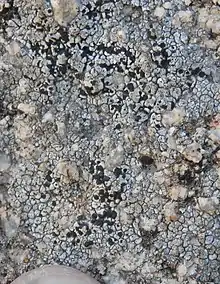Buellia dispersa
Buellia dispersa is a dull white to beige or dark brown crustose areolate lichen that grows on non-calcareous rock, such as basalt, granite and gneiss, in arid to semi-arid areas of northern Africa, Europe, and southwestern North America.[1][2] The areolas are distinct, becoming subsquamulose (lifting up at the edges) when separated and collecting in irregular patches, otherwise they form rosettes with lobed margins.[1] There is no prothallus.[1] It commonly occurs in the Mojave Desert, Channel Islands, and Santa Monica Mountains, also in the Cuyamaca Mountains, Santa Ana Mountains, and San Jacinto Mountains.[2] It is among the most common lichen species in the Sonoran Desert.
| Buellia dispersa | |
|---|---|
 | |
| Scientific classification | |
| Domain: | Eukaryota |
| Kingdom: | Fungi |
| Division: | Ascomycota |
| Class: | Lecanoromycetes |
| Order: | Caliciales |
| Family: | Caliciaceae |
| Genus: | Buellia |
| Species: | B. dispersa |
| Binomial name | |
| Buellia dispersa A.Massal. (1856) | |
See also
References
- Lichen Flora of the Greater Sonoran Desert Region; Nash, T.H., Ryan, B.D., Gries, C., Bugartz, F., (eds.), 2001, Vol 3,
- Buellia dispersa in the Joshua Tree National Park (California, U.S.A.) Map collection; Kerry Knudsen, Kocourková Jana; Czech University of Life Sciences Prague, Faculty of Environmental Sciences, Department of Ecology, Czech Republic, 2012,
This article is issued from Wikipedia. The text is licensed under Creative Commons - Attribution - Sharealike. Additional terms may apply for the media files.